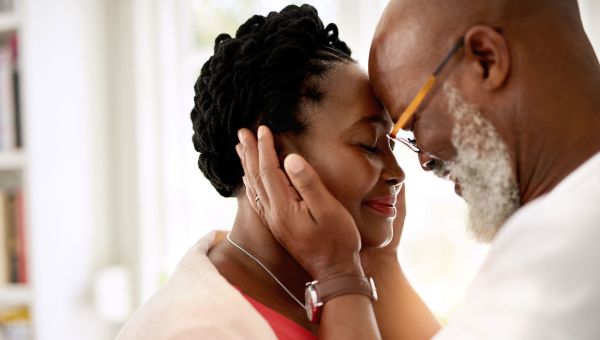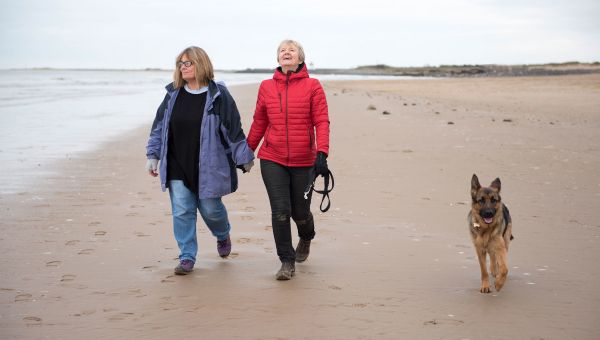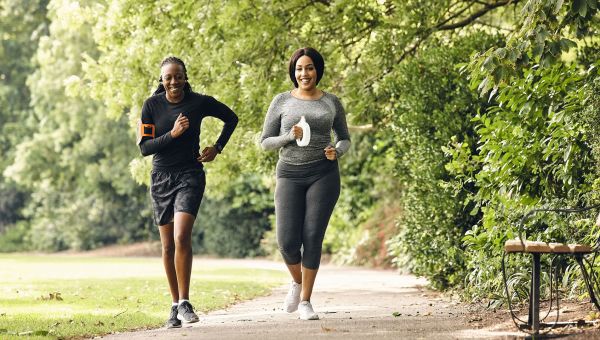7 ways a strong relationship can boost your health
Whether it’s a romantic partner, close friend, family member or a good neighbor, the benefits of a bestie are profound.

It’s often the small things your partner does—shutting the blinds while you’re napping, packing your favorite snacks—that make a relationship meaningful. But as it turns out, a loving partnership may provide big long-term benefits as well. It may even add years to your life.
Lonnie Barbach, PhD, a couple's therapist in private practice in Mill Valley, California, explains how a strong partnership could influence your health. Barbach is the co-author of Going the Distance: Finding and Keeping Lifelong Love, written with her partner, David Geisinger, PhD, and co-founder of the Happy Couple game app.
Here are some surprising benefits of a supportive long-term relationship (LTR)—plus tips for keeping yours healthy.

Pick the LTR that’s right for you
It’s not necessary to be in a romantic relationship to access the benefits of an LTR—the healthiest connection is the one that’s authentic to you. That could mean sharing life with a close friend or family member or building a tight-knit village of family and friends.
“You don't have to be married or even living with someone to feel supported, to talk about things that matter, to know someone has your back,” says Barbach.
Dan Buettner, author of The Blue Zones Solution, stresses the importance of friendship in his research on longevity. Residents of Blue Zones, areas with the world’s longest-living people, tend to:
- Belong to lasting friend groups
- Live near family members when possible
- Build strong connections in their communities
Try to surround yourself with uplifting people who will keep you young and share your healthy habits.

Shield each other from stress
Stress can worsen or trigger bouts of depression and anxiety and encourage unhealthy behaviors—like smoking or drinking too much alcohol—that contribute to long-term disease risk.
“In a happy relationship, where you have someone to talk to about difficult things, stress is reduced,” says Barbach. And certain intimate acts like hugging release oxytocin, a hormone that eases anxiety and elevates mood.
Intimacy may also help to limit excessive stress hormones. Normally, when your body senses a threat, it undergoes physical changes—including the release of certain hormones—that are meant to help you survive. This “fight-or-flight” response can be life-saving in a dangerous situation. But remaining in this state day-to-day isn’t healthy and can interfere with your body’s ability to function, upping your risk of conditions such as heart disease.
One study published in 2019 compared the stress response in couples who shared spontaneous acts of intimacy before and after a stressful event with couples who didn’t. The intimate couples experienced a faster return to normal levels of stress hormones when the “threat”—in this case an interview—had passed.

Ward off loneliness
Loneliness is an epidemic today. In fact, 47 percent of Americans over age 18 report feeling lonely some or most of the time. Loneliness isn’t the same as being alone—it’s a sense of loss from not having meaningful connections. Feeling this way over time may be riskier than obesity and has been linked to a 50 percent greater chance of dying prematurely.
A strong partnership can ease loneliness by:
- Providing a sense of purpose, which promotes longevity
- Letting you tackle problems together, instead of turning to isolated activities, like watching TV, to cope
“You have a purpose in supporting your person and taking care of them,” explains Barbach. “We do find that people who have that sort of meaning in life feel better. They're happier and they live longer."

Protect your heart
Broken heart syndrome—a real, stress-related condition that interferes with your heart’s ability to pump—is just one example of how a poor relationship can hurt your heart. On the other hand, people in happy marriages tend to have fewer:
- Heart attacks
- Days in the hospital after heart surgery
- Hospital readmissions after heart surgery
A solid partnership can protect you from stress, explains Barbach, which is a key risk factor for several heart conditions. Stress may even change the way your blood clots.
Being chronically stressed may also lead some people to adopt harmful coping mechanisms like binge-eating greasy, salty foods, which can contribute to problems like high blood pressure and heart disease.

Stay mentally sharp
Having an optimistic partner may help ward off certain risk factors associated with Alzheimer’s disease and other forms of dementia, according to a November 2019 study published in the Journal of Personality.
For the study, researchers at Michigan State University measured the optimism of 4,457 heterosexual couples and assessed their memory and mental status every two years for a total of eight years. They found that those who were married to optimists consistently scored better over the course of the study.
The researchers didn’t investigate why optimism was associated with less cognitive decline over time, but they theorized that optimists may encourage their partner to adopt brain-healthy habits, such as not smoking, exercising and eating a healthy diet.
Worried you or your partner aren’t “glass is half full” people? Make an effort to look on the bright side. The study’s authors contend that optimism is a quality that can be acquired over time with some “training” or intention.
Another 2017 review published in the Journal of Neurology, Neurosurgery & Psychiatry also found that marriage is associated with lower rates of dementia, compared with being single or having lost a spouse. Researchers analyzed 15 existing studies on the subject, which revealed that staying single as an adult raised dementia risk by 42 percent.
That said, in an interview with CNN, the lead author of the study noted that the meaning of marriage has been changing as more people are choosing non-traditional relationships—and the health effects of staying single may be changing as well.
The authors suggested this health benefit may, in fact, come from the smart choices—like getting routine medical care and socializing often—that tend to accompany marriage.
Learn more ways to boost your brain health.

Support healing
In one experiment, people who talked openly with, laughed with, and said nice things to their partner healed faster from a wound than those who had hostile interactions with their partner.
Another study revealed that unmarried people were more than three times more likely to pass away before the three-month mark after heart surgery than married people. According to interviews with study participants, this may have been due—at least in part—to married people:
- Having a more positive outlook before surgery than unmarried people
- Reporting greater confidence in their ability to control pain and anxiety related to surgery
- Being less likely to smoke tobacco
Regardless of relationship status, you don’t need to face a recovery alone. Ask to speak with a hospital counselor or chaplain, or join a support group. And if you’re caring for a partner, know it’s common to feel isolated in that role—even when you’re together. It’s important to be on the lookout for signs of caregiver burnout and to seek resources in your area if you could use help.

Soothe your pain
Simply holding your partner’s hand may ease pain, according to a small 2018 study. Heterosexual women who held their loved one’s hand while exposed to “mild heat pain” reported lower pain scores compared to women near their partner or those with a partner in another room. And, remarkably, when couples joined hands, their heart rates, breathing patterns, and brain waves moved in sync. This brain wave coupling may be a key source of pain relief.
“We know that if loved ones lie in bed with their arms around each other, they will start to breathe in sync and feel more relaxed,” adds Barbach. Another way to soothe each other? "When you come home, take a 30-second hug,” she recommends. “Thirty seconds isn't very long, but it's long enough to relax into the hug and feel that connection.”

Keep each other fit
Healthy habits may be contagious between partners. Even if you aren’t actively dieting, for example, you may slim down if your partner is. In one study funded by Weight Watchers, 32 percent of people whose partners were enrolled in a weight loss program dropped at least three percent of their body weight over six months.
The opposite can be true too—when one person gains weight, the other may pack on pounds. This can strain a relationship if the partner who’s trying to diet feels their efforts aren’t being respected. “In a good relationship, you want your partner to be healthy,” says Barbach. “You want them around. If they’re overweight, support their diet.” Encourage them by:
- Choosing active dates like hiking or spending a day at the park
- Getting competitive—see who can jump rope or hula hoop longest
- Praising healthy choices, instead of criticizing bad habits
Use an app like Sharecare (available for iOS and Android) to track your activity—and see if you can best each other’s daily step count.

Make strong connections
Whether you’re dating, in a relationship, or happily single, there are plenty of ways to create more personal connections. One approach is to combine social activities with other health boosters, like staying mentally active, walking daily and spending time in green spaces.
Adopting a pet, for example, can lead to more outdoor walks—your new best friend may even introduce you to other pet lovers. (Visit the ASPCA.) Another option is to take classes or join an active Meetup group in your area.
Volunteering can improve your community while making you feel better about yourself as well, says Barbach. “You’re giving back, being useful and meeting people at the same time.”

Avoid toxic connections
It’s worth remembering that not every LTR is good for you. A partnership may boost your health if it’s a source of comfort and mutual growth—not if it’s a source of toxic stress.
“I think people are loneliest in a relationship or a marriage that’s unhappy,” says Barbach. “You feel alienated and alone—more so than if you were totally by yourself.”
If you and your partner have felt repeatedly hurt by each other, a licensed couples therapist can help. A counselor can offer the tools and guidance you need to communicate more effectively.
If you or someone you know is experiencing intimate partner violence, contact The National Domestic Violence Hotline at 800-799-7233 or 800-787-3224 (TTY).
More On


video

article

slideshow


video


video
